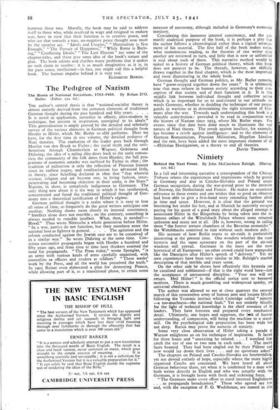The Pedigree of Nazism
THE author's central thesis is that "national-socialist theory is almost entirely derived from the common elements of traditional German thought during the past hundred and fifty years. . . . It is novel in application, surrealist in affinity, ultra-modern in technique, but ancient in inspiration, unoriginal in its ideals." This generalisation is amply proved by the detailed and scholarly survey of the various elements in German political thought from Herder to Hitler, which Mr. Butler so ably performs. Here we have, for the first time in one volume, the detailed pedigree of Nazi theories. The exaltation of the leader goes back through Moeller van den Bruck to Fichte ; the racial myth and the anti- Semitism through Chamberlain to Wagner, Gobineau and Diihring; the idea of a ruling elite dates back to the early roman- tics; the community of the folk dates from Herder; the full pro- gramme of economic autarky was outlined by Fichte in riloo ; the tradition of militarism is only the reflection of Prussian history since its earliest stages; and totalitarianism has advanced little, in theory, since Schelling declared in 1800 that "that wherein science, religion and art become one, in living fashion, inter- penetrating and becoming objective in their unity, is the State." Nazism, in short, is completely indigenous to Germany. The only thing new about it is the way in which it has synthesised, concentrated and fused the traditional political thought of Ger- many into a theoretical justification of Hitler's regime. German political thought is a realm where it is easy to lose all sense of time, so frequently do the great writers anticipate one another. Nothing shows more clearly its internal consistency. "Intellect alone does not ennoble ; on the contrary, something is always needed to ennoble intellect. What, then, is needed?— Blood." Thus wrote Nietzsche a whole generation before Hitler. "In a war, parties do not function, but their members enter the national host as fighters in general. . . . The agitation and the reform conducted against the Jewish race are to be conceived of in a similar way." So wrote Diihring at the same time. Con- scious nationalist propaganda began with Herder a hundred and fifty years ago, and from time te time later thinkers asserted the need for propaganda. "The Press today," wrote Spengler, "is an army with various kinds of arms carefully organised, with journalists as officers and readers as soldiers." "Three weeks' work by the Press, and all the world has perceived the truth." In 1905 Reiner even elaborated a plan for destroying France, while allowing part of it, as a transitional phase, to retain some
measure of autonomy, although included in Germany's economic territory.
Considering this immense internal consistency, and the pri- marily analytical purpose of the book, it is perhaps a pity that the author follows a chronological rather than a logical arrange- ment of his materiaL The first half of the book makes some- what monotonous reading, as the theories of one writer after another are reviewed in turn, and little that is new or unfamiliar is said about each of them. This narrative method would be suited to a history of German political theory, which this book does not purport to be. The threads however, are skilfully drawn together in the final chapter, which is the most important and most illuminating in the whole book.
German thought and German politics, as Mr. Butler remarks, have "goose-stepped together down the years." It is ultimately true that men behave in human society according to their con- ception of that society and of their function in it. It is this middle link between individual thought and collective action which is so important for us to understand in our attitude to- wards Germany, whether in deciding the technique of our propa- ganda in wartime or in determining the right treatment of Ger- mans after the war. Towards such understanding this book is a valuable contribution: provided it be read in conjunction with the history of Nazism since 1933, where Mr. Butler stops. For events since that date have done much to illuminate the real nature of Nazi theory. The revolt against intellect, for example, has become a revolt against intelligence : and to the elements of German Romanticism, Prussian Militarism, Hegelian Idealism and the rest, have been added the most important element of all —Hitlerian Hooliganism, or a theory to end all theories.
DAVID THOMSON.


























 Previous page
Previous page